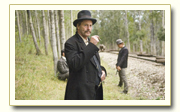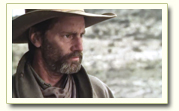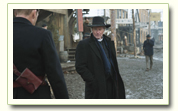|

The playwright and actor understood the cowboy life
offered the best tests for civilization. Sam Shepard
died July 27, 2017, at the age of 73, after a
hard-fought battle with A.L.S. His understated, natural
style recalled actor Gary Cooper—both were movie-star
handsome and exuded effortless self-confidence and
masculinity...
His chivalry touched this magazine personally, when
Shepard asked the publisher’s permission before calling
what would become one of his most-performed plays "True
West".
Much admired as an actor, often described as the
greatest playwright of his generation, Shepard won the
Pulitzer Prize for "Buried Child", in 1979, and was
nominated twice more. As an actor, he was nominated for
an Oscar for his performance in 1983’s "The Right Stuff"
and for an Emmy for 1999’s "Dash and Lilly". In fact,
over his career, he won or was nominated for just about
every award a playwright or an actor could receive.
His was not the life one might have predicted for a
former ranch hand, rodeo cowboy and Rock band drummer
who spent his one formal college year studying
agriculture at Mt. San Antonio College in Walnut,
California. His parents were farmers and teachers in
Illinois. His father had been a bomber pilot during
WWII, flying numerous raids over Italy. Tragically, his
war experiences left him an alcoholic and a broken man.
The explosiveness of Shepard’s family dynamic fueled his
plays. When Shepard turned 30, he already had 30 plays
produced.

Sam Shepard had "Western" written all over him, and he
looked to the American West to inspire him, whether as
an actor or a playwright. "…there’s more drama that goes
down in a rodeo than one hundred plays you can go to
see. It’s a real confrontation, a real thing going on,"
he told American Theatre in April 1984. "…I’ve been in a
few rodeos, and the first team roping that I won gave me
more of a feeling of accomplishment and pride of
achievement than I ever got winning the Pulitzer Prize.
At the same time, I’m glad that the plays are successful
and that they do something to people."
Best known to Westerns fans as an actor, Shepard did not
take that role seriously until he was befriended by
fellow farmboy and iconic writer-director of 1973’s
"Badlands", Terrence Malick. "I was totally devoted to
writing at that point," Shepard said, adding, "I was
running a little ranch up in northern California."
Malick was writing "Days of Heaven", a story set in the
early 20th century, about a poor migrant farm worker
(played by Richard Gere) who convinces his lady love
(Brooke Adams) to marry their wealthy, but dying,
employer to inherit his fortune. Malick offered Shepard
the role of the doomed rancher.
"I said, 'Why not?' I rented a Ford Mustang and drove to
Alberta, Canada, and that was it," Shepard recalled.
One of the most physically beautiful movies ever made,
it turned the three leads into stars.
Although modern and sophisticated—Shepard did much of
his writing in New York City and London—something about
his looks suited historical stories. He would play many
characters in many time periods, but he always returned
to the American West. His understanding and respect for
that world, and its people, informed all of his work.
"This notion of the cowboy and of the West," he said
recently, "and this solitary character, this person who
was able to fend for himself, in spite of everything
else, to be self-sufficient: it’s a very important
thing, which gets more and more lost as we move into our
idea of civilization. We don’t have that quality
anymore; we don’t have that way of testing ourselves."

Sam Shepard’s final Western set in the frontier was
"Klondike", about the Yukon gold rush during the late
1890s, a miniseries that appeared on Discovery Channel
in 2014.
Whether in a lead or supporting role, his presence in a
Western lent it authenticity. He was endearing as
Pea-Eye Parker in the 1995 sequel to "Lonesome Dove",
"Streets of Laredo". That same year, he played Tarnell,
cowhand buddy to Tommy Lee Jones’s Hewey Calloway in the
Jones written-directed feature "The Good Old Boys". Five
years later, Shepard played the sympathetic lawyer in
"All the Pretty Horses".
In 2006, in the Western Action-Comedy "Bandidas",
Shepard played Mr. Buck, a retired bank robber coaching
two ladies, played by Penélope Cruz and Salma Hayek, in
his former trade.
The frontier West even inspired Shepard and wife O-Lan
Jones to name their son Jesse, after outlaw Jesse James,
in 1970. Shepard went on to play Jesse James’s brother
Frank in 2007’s under-appreciated "The Assassination of
Jesse James by the Coward Robert Ford". Though at 64,
Shepard was 25 years older than the real-life Frank, his
performance was excellent. His sober distrust of Ford
made him easily the smartest guy in the bunkhouse.
In the 1999 Fantasy Western "Purgatory", Shepard is the
gunless lawman in the town of Refuge, a waiting place
for deceased Westerners whose final destination is not
yet determined. His character may be called Sheriff
Forrest, but he died holding aces and eights.
His final Western lead was in 2011’s "Blackthorn".
Living in Bolivia, where the movie was filmed, James
Blackthorn (Shepard) is actually Butch Cassidy, who
survived the shoot-out that killed his partner. Now an
old man, he decides to head home, with the assistance of
a young robber (Eduardo Noriega).
"Sam’s voice was very singular. It was very distinctive,
like all great writers," recalls Tracy Letts, who wrote
the Pulitzer-winning "August: Osage County" that
inspired the 2013 film that Shepard acted in as the
patriarch, in an interview with PBS. "And he synthesized
a lot of different elements—European avant-garde, Rock
’n’ Roll, cowboy movies, poetry and a working-class
sensibility. He synthesized all of that, and when it
came out in his writing, it was such a new and exciting
and individual and true voice."
The voice will live on.
|